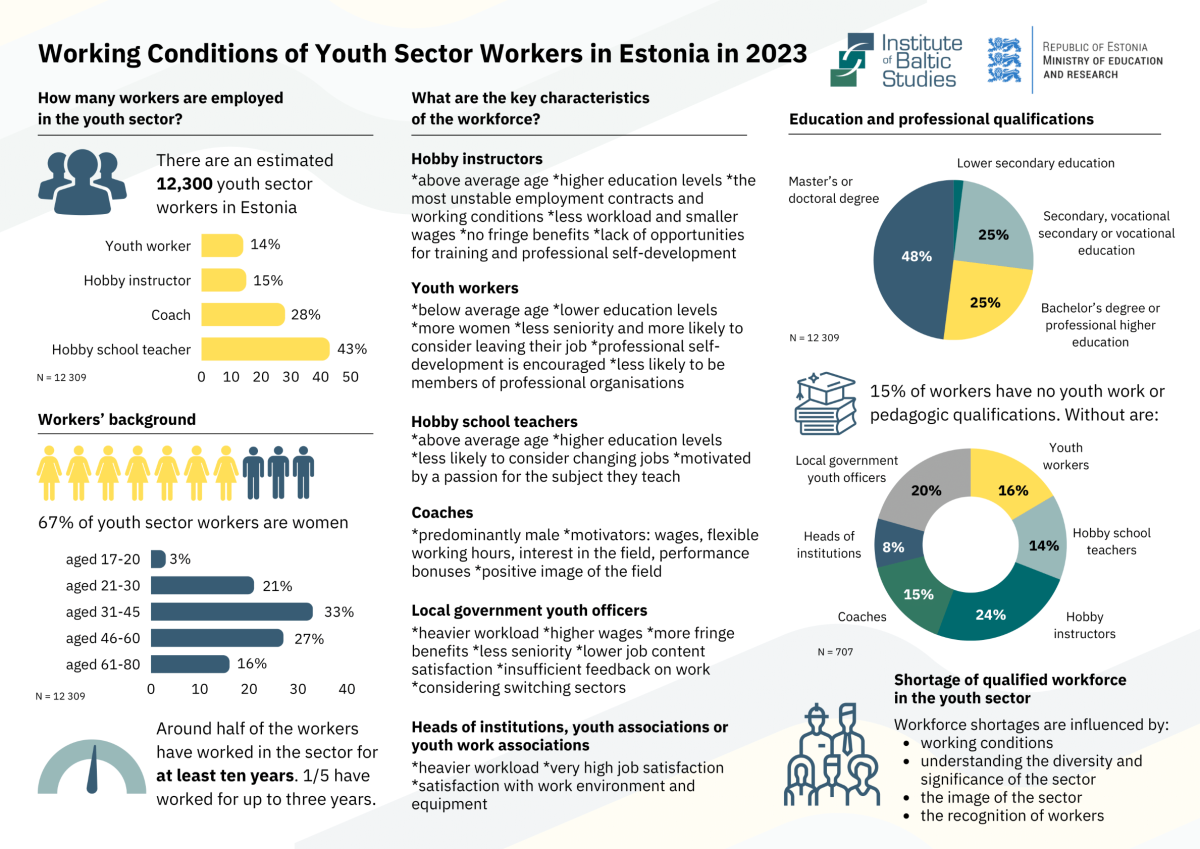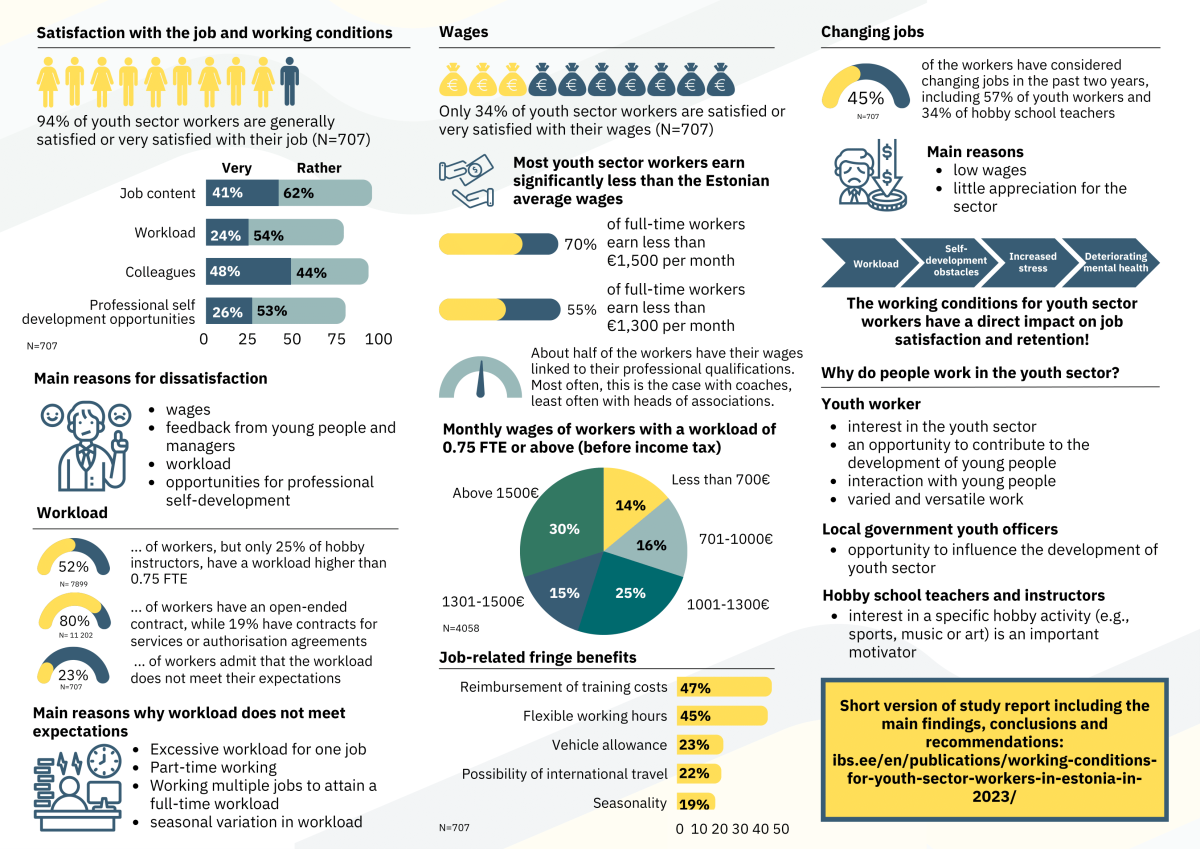Organisation of youth work
Local authorities (council, rural municipality or city government, and institutions and partners administered by them) are responsible for planning the obligations of youth work and the extent of activities and funds arising therefrom.
The organisation of youth work of local authorities is regulated under the Youth Work Act and Local Government Organisation Act The organisation model based on local authorities also follows an important starting point of carrying out youth work that youth work must be as close to youth as possible and take fully into account the principle of autonomy of local authorities applicable to the administrative organisation of the state.
Local authorities and the state are partners within the context of the organisation of youth work in Estonia. The state creates a legal and strategic framework and supports local authorities in terms of priority areas and provision of services. The activities of local authorities are directed and supported through state support programmes. The aim is to enhance the availability of youth work and guarantee services of better quality in institutions associated with youth.
At different levels a common practice of delegating the tasks of practical implementation of youth work to NGOs is used. At the national level, the development of youth affairs is supported by several umbrella organisations, societies uniting different professions and organisations of youth work, youth associations and foundations. Hobby schools, work brigades, camps, youth centres as well as youth associations managed by the non-profit and private sectors render their services at the level of local government.
The Cultural Affairs Committee processes the topics of youth affairs as a leading committee in the Riigikogu (the Parliament). Youth affairs is the responsibility of the Ministry of Education and Research that plans youth policy, organizes youth work and manages the work of the Education and Youth Board.
Youth work structures
A youth centre is a youth work agency whose activities are organised by local authorities or non-profit associations. A youth centre has the widest range of services of youth work and is the primary youth work provider. Youth centres may exist in various forms, but most of them are characterised by applying the open youth work method. In 2021, there are approximately 300 youth centres in Estonia.
A hobby school is an educational establishment operating in the area of youth work that creates an opportunity for the acquisition of hobby education and for the diverse development of the personality, including cultivation of one’s own language and culture, in different areas of hobby education. The uniform requirements for hobby education have been prescribed in the Hobby Schools Act and Standard for Hobby Education. These regulations are applicable to all the hobby schools, irrespective of their legal status. Estonia had 774 hobby schools in 2021 and a total of 104 998 young people studied in these schools during the 2020/2021 school year.
A youth association is a non-profit association at least two-thirds of the members of which are young people and the objective of which is the organisation and provision of youth work. In 2018, the Ministry of Education and Research supported through a strategic partnership 9 state level youth associations (incl. the Estonian National Youth Council, Estonian School Student Councils Union and the Federation of Estonian Student Unions) and through a one-year operational support 9 youth associations.
A youth summer work camp is a work education project supporting the competitiveness of youth that connects the possibilities of working and youth work. The objective of the summer work camp is to increase the competitiveness of youth through the development of work-related skills and knowledge of youth. 68 organisers of summer work camps received a support in 2021. The total number of young people participating in the activities of summer work camps was 4385.
Permanent youth camps and youth project camps are camps offering recreational and developing holidays of more or less than 60 days, respectively. The duration of one camp period is at least six twenty-four-hour periods. Camps are organised by hobby schools, youth centres, youth organisations, etc. 25 permanent youth camps and490 youth project camps with 25 442 young participants operated in Estonia in 2021.
A youth work association is a non-profit association, a union of non-profit associations or a foundation the objective of which is the integration of youth workers, youth work agencies or other providers and organisers of youth work, and representation of their interests. For instance, such associations include Association of Estonian Youth Workers, Association of Estonian Open Youth Centres, Estonian Music Schools Union, Estonian Art Schools Union and Estonian Hobby Schools Union.
The aim of the youth councils is to enable youth to participate in the decision-making process and protect their interests in spheres that concern them. A participation council usually does not have a legal status and the membership of such council has been elected or delegated amongst young people. 55 regional and local forms of youth participation were operational in Estonia in 2021. School student councils of different levels of education also act in Estonia as important forms of youth participation.
Youth work in school is youth work provided in primary, secondary and vocational schools. School youth work supports the achievement of goals set out in the school curriculum, is based on extracurricular activities and is organised by the school youth worker, school student council or hobby group leaders.
Funding of Youth Work
Youth work in Estonia is mainly funded from the municipal budget according to the priorities approved in the development plan of the municipality.
Usually local governments allocate funding for local youth programmes and projects, such as youth camps, sports events and hobby activities in schools, and support youth associations. Open calls for grants for youth work and youth projects are also carried out and grants allocated to NGOs and other providers of youth work activities and services.
Local governments often also maintain hobby schools (music, sports, art, nature, etc) and youth centres, fund the costs related to management of buildings and staff as well as young people’s participation in youth workactivities.
Activities pursuing wider national impact in youth work are funded from the state budget.
Grants from state budget are allocated to youth organisations with at least 500 members that are organising high quality activities in at least 5 counties. Funding from the state budget is also provided for youth work associations and umbrella organisations that represent larger sectoral stakeholders.
A separate national programme has also been created to support youth participation, particularly youth participatory structures such as youth councils. State budget also provides funding for youth camps, youth working camps as well as small grants for projects that are implemented by youth centres, hobby schools or youth organisations.
The Education and Youth Board coordinates the implementation of the Erasmus+ and European Solidarity Corps programmes which offer funding opportunities for the mobility of young people and youth workers, youth participation, development of youth work, solidarity and volunteering projects.
With the support of the European Social Fund+ and the Estonian state budget, from 2023 until 2029 a national programme is implemented by the Education and Youth Board to develop the quality of youth work, provide support for NEET young people through youth work, to strengthen the Youth Monitoring and Analysis System and to support the mental health of young people. The total budget of the programme is 13.66 million euros.
Youth Sector Workforce
There are an estimated 12,300 youth sector workers in Estonia in 2023. According to registry data, 43% of them are teachers in hobby schools, 28% are youth (sport) coaches, 15% hobby instructors and 14% youth workers. The workforce is predominantly female, with 67% women and 33% men, and has diverse educational backgrounds.
Based on registry data, nearly half of the workforce hold a master’s degree or higher qualification. The highest proportions of such degrees are observed among hobby school teachers (61%) and hobby instructors (58%), while the lowest proportion is seen among youth workers (27%). According to survey results, 42% of employees and 53% of employers have higher pedagogical education; 18% of both employees and employers have higher education in youth work.
In 2022, the Ministry of Education and Research commissioned a study into the working conditions of the youth sector workers in Estonia which was carried out by the Institute of Baltic Studies. More information about the background and working conditions of the youth sector workers can be found in the Fact Sheet or Brief Study Report of the 2023 study on the Working Conditions of the Estonian Youth Sector Workers.


Last updated: 06.03.2024